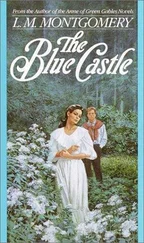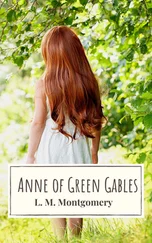My favourite Sunday book, however, was a thin little volume entitled The Memoir of Anzonetta Peters. I shall never forget that book. It belonged to a type now vanished from the earth - fortunately - but much in vogue at that time. It was the biography of a child who at five years became converted, grew very ill soon afterward, lived a marvellously patient and saintly life for several years, and died, after great sufferings, at the age of ten.
I must have read that book a hundred times if I did once. I don't think it had a good effect on me. For one thing it discouraged me horribly. Anzonetta was so hopelessly perfect that I felt it was no use to try to imitate her. Yet I did try. She never seemed by any chance to use the ordinary language of childhood at all. She invariably responded to any remark, if it were only "How are you to-day, Anzonetta?" by quoting a verse of scripture or a hymn stanza. Anzonetta was a perfect hymnal. She died to a hymn, her last, faintly-whispered utterance being
"Hark, they whisper, angels say,
Sister spirit, come away."
I dared not attempt to use verses and hymns in current conversation. I had a wholesome conviction that I should be laughed at, and moreover, I doubted being understood. But I did my best; I wrote hymn after hymn in my little diary, and patterned the style of my entries after Anzonetta's remarks. For example, I remember writing gravely "I wish I were in Heaven now, with Mother and George Whitefield and Anzonetta B. Peters."
But I didn't really wish it. I only thought I ought to. I was, in reality, very well contented with my own world, and my own little life full of cabbages and kings.
I have written at length about the incidents and environment of my childhood because they had a marked influence on the development of my literary gift. A different environment would have given it a different bias. Were it not for those Cavendish years, I do not think Anne of Green Gables would ever have been written.
When I am asked "When did you begin to write?" I say, "I wish I could remember." I cannot remember the time when I was not writing, or when I did not mean to be an author. To write has always been my central purpose around which every effort and hope and ambition of my life has grouped itself. I was an indefatigable little scribbler, and stacks of manuscripts, long ago reduced to ashes, alas, bore testimony to the same. I wrote about all the little incidents of my existence. I wrote descriptions of my favourite haunts, biographies of my many cats, histories of visits, and school affairs, and even critical reviews of the books I had read.
One wonderful day, when I was nine years old, I discovered that I could write poetry. I had been reading Thomson's Seasons, of which a little black, curly-covered atrociously printed copy had fallen into my hands. So I composed a "poem" called "Autumn" in blank verse in imitation thereof. I wrote it, I remember, on the back of one of the long red "letter bills" then used in the postal service. It was seldom easy for me to get all the paper I wanted, and those blessed old letter bills were positive boons. Grandfather kept the post office, and three times a week a discarded "letter bill" came my grateful way. The Government was not so economical then as now, at least in the matter of letter bills; they were then half a yard long.
As for "Autumn," I remember only the opening lines:
"Now autumn comes, laden with peach and pear;
The sportsman's horn is heard throughout the land,
And the poor partridge, fluttering, falls dead."
True, peaches and pears were not abundant in Prince Edward Island at any season, and I am sure nobody ever heard a "sportsman's horn" in that Province, though there really was some partridge shooting. But in those glorious days my imagination refused to be hampered by facts. Thomson had sportsman's horns and so forth; therefore I must have them too.
Father came to see me the very day I wrote it, and I proudly read it to him. He remarked unenthusiastically that "it didn't sound much like poetry." This squelched me for a time; but if the love of writing is bred in your bones, you will be practically non-squelchable. Once I had found out that I could write poetry I overflowed into verse over everything. I wrote in rhyme after that, though, having concluded that it was because "Autumn" did not rhyme that Father thought it wasn't poetry. I wrote yards of verses about flowers and months and trees and stars and sunsets. and I addressed "Lives" to my friends.
A school chum of mine, Alma MÑ, had also a knack of writing rhyme. She and I had a habit, no doubt, a reprehensible one, of getting out together on the old side bench at school, and writing "po'try" on our slates, when the master fondly supposed we were sharpening our intellects on fractions.
We began by first writing acrostics on our names; then we wrote poems addressed to each other in which we praised each other fulsomely; finally, one day, we agreed to write up in stirring rhyme all our teachers, including the master himself. We filled our slates; two verses were devoted to each teacher, and the two concerning the reigning pedagogue were very sarcastic effusions dealing with some of his flirtations with the Cavendish belles. Alma and I were gleefully comparing our productions when the master himself, who had been standing before us but with his back toward us, hearing a class, suddenly wheeled about and took my slate out of my paralyzed hand. Horrors! I stood up, firmly believing that the end of all things was at hand. Why he did not read it I do not know, it may be he had a dim suspicion what it was and wanted to save his dignity. Whatever his reason, he handed the slate back to me in silence, and I sat down with a gasp, sweeping off the accusing words as I did so lest he might change his mind. Alma and I were so badly scared that we gave up at once and forever the stolen delight of writing poetry in company on the side bench!
I remember - who could ever forget it? - the first commendation my writing received. I was about twelve and I had a stack of poems written out and hidden jealously from all eyes, for I was very sensitive in regard to my scribblings and could not bear the thought of having them seen and laughed at. Nevertheless, I wanted to know what others would think of them, not from vanity, but from a strong desire to find out if an impartial judge would see any merit in them. So I employed a little ruse to find out. It all seems very funny to me now, and a little pitiful; but then it seemed to me that I was at the bar of judgment for all time. It would be too much to say that, had the verdict been unfavourable, I would have forever surrendered my dreams, but they would certainly have been frosted for a time.
A lady was visiting us who was something of a singer. One evening I timidly asked her if she had ever heard a song called "Evening Dreams."
She certainly had not, for the said "Evening Dreams" was a poem of my own composition, which I then considered my masterpiece. It is not now extant, and I can remember the first two verses only. I suppose that they were indelibly impressed on my memory by the fact that the visitor asked me if I knew any of the words of the "song." Whereupon I, in a trembling voice, recited the two opening verses:
"When the evening sun is setting
Quietly in the west,
In a halo of rainbow glory,
I sit me down to rest.
I forget the present and future, I live over the past once more, As I see before me crowding The beautiful days of yore."
Strikingly original! Also, a child of twelve would have a long "past" to live over!
I finished up with a positive gasp, but the visitor was busy with her fancy work, and did not notice my pallor and general shakiness. For I was pale, it was a moment of awful import to me. She placidly said that she had never heard the song, but "the words were very pretty."
Читать дальше





